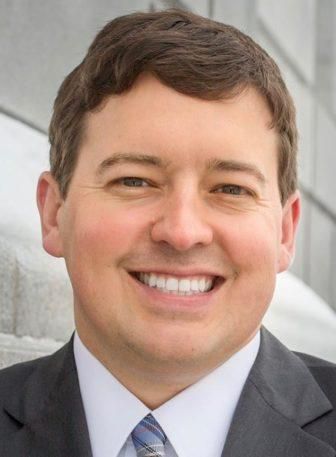Next week, Jacqueline Sartoris will be on the primary ballot as a Democrat for the Cumberland County District Attorney’s office, but whether the unsolicited support of a national-level political action committee will help or derail her efforts to unseat incumbent Jonathan Sahrbeck remains to be seen.
Sahrbeck first ran for district attorney in 2018 when his former boss, Stephanie Anderson, retired after 28 years in the position. Sartoris, who currently serves as an assistant district attorney in Kennebec County while living in Brunswick, said she wanted to serve in her home county.
While Sartoris announced early that she was going to run a “low-budget, grassroots effort,” her campaign — according to the Maine Ethics Commission — has been buoyed by a $300,000 contribution from Democracy II, a Washington, D.C.-based super PAC funded by billionaire and Democratic political activist George Soros.
Sartoris said the funding was unexpected and unsolicited.
Soros’ name appears in the fine print in a series of glossy campaign materials that have been mailed to residents of Cumberland County. The mailings paint an unflattering picture of Sahrbeck and resemble the type of political advertising seen in higher-profile general election races.
Sartoris said she first learned of the PAC’s involvement when she and her volunteers received mailings over the Memorial Day weekend.
“We were shocked,” Sartoris said. “I’m not taking responsibility for a (super) PAC I have no relation to. If you got a glossy mailer, it’s not from me.”
The repeated mailings prompted Sahrbeck’s campaign to issue a press release on May 31 denouncing the PAC’s involvement and calling for Sartoris to do the same.
“This type of outside spending is just outrageous,” Sahrbeck said. “Folks in Cumberland County should be disgusted by this attempt to buy this race.”
Why Democracy PAC II got involved in a primary race between two Democrats is unclear. A spokesperson for the PAC declined to comment on the sizable contribution and didn’t explain the PAC’s involvement.
Mark Brewer, professor and interim political science chair at the University of Maine, said he wasn’t surprised at the national PAC’s involvement. Such groups have been common on the national political scene since the rise of the conservative Koch brothers-backed Citizens’ United.
What’s new, Brewer said, is that activists are moving beyond presidential and high-profile U.S. congressional races and looking to influence local contests.
“It’s becoming less and less unusual,” he said.
As to why a George Soros-backed super PAC would care about a district attorney’s race in Maine, Brewer said progressive agendas include supporting significant police reform, making a candidate for district attorney an ideal beneficiary.
“District attorney races have actually become kind of hot,” Brewer said. “You can have a lot of bang for your buck (in these types of local races).”
Brewer said the involvement of an out-of-state super PAC — run by a billionaire who isn’t from Maine — is likely to turn off voters who, like Sahrbeck, don’t like the idea of someone “from away” attempting to influence a primary race between candidates from the same party.
“I think that’s what out-of-state interests fail to understand about Maine. You could do your candidate more harm than good,” Brewer said.
Sartoris said she decided to run when — during political canvassing — she asked if Cumberland County residents felt they were getting real reform from the current district attorney’s office.
“Almost to a person, they said we’re not,” she said.
Sartoris said she wants to see the district attorney set clear, measurable goals and make themselves accountable to the public for meeting those targets.
“There’s zero information that’s going to the public,” she said.

Sartoris said she wants the district attorney to pay more attention to crimes that are undercharged, such as hate crimes, domestic abuse, sexual assault and crimes against women.
“It’s a really heavy lift to get past cultural bias against these victims,” she said.
Sartoris said she supports the idea that some people charged with crimes need help, not jail. She wants to give first-time nonviolent offenders access to services and resources, such as mental health or substance-abuse treatment — if it’s clear support will stop them from committing crimes in the future.
Sartoris also said a large number of minor offenses, like driving with a suspended license or driving without registration, come from issues that can be easily corrected. She’s a proponent of dismissing charges if an offender shows proof that the problem has been addressed, such as getting a license renewed. Otherwise, she said, the system will remain too overburdened to handle more serious offenses.
“This is criminalizing poverty,” Sartoris said. “Meanwhile, you punch your partner in the face, and that’s a misdemeanor.”
Sahrbeck, who faced criticism for changing party affiliation, both in 2018 to unenrolled and again last year to Democrat, said he is focused on progressive changes, particularly with criminal defendants suffering from mental illness or substance-abuse issues.
“I decided to take that step to enroll (as a Democrat) based on my record of reform and from speaking to other Democrats across the state, including Democratic district attorneys,” he said.
Sahrbeck said he believes in diversion programs that provide people with mental illness or similar problems the help they need, which doesn’t always mean jail.
“I think that’s an important step that we all need to look into as a community,” he said. “We would much rather get people into treatment than have them incarcerated.”
Sahrbeck said he also doesn’t want to see a system bogged down with minor criminal charges. He said such criminal filings have dropped from 5,800 in 2020 to 5,300 today. The change, he said, reflects fewer charges being filed once an offender shows they have remedied the cause of minor violations, such as driver’s license or similar renewals.
Sahrbeck also noted that the number of offenders being held prior to trial has gone down since he took office, due to a review of the bail system and an improved assessment of offenders’ needs.
Sahrbeck said he has addressed crimes such as spousal abuse and hate crimes by adding a prosecutor and a victim’s advocate to his staff specifically to deal with those types of offenses.
“That’s what I’ve been doing since 2019, and I think we’re on a good path,” he said.



